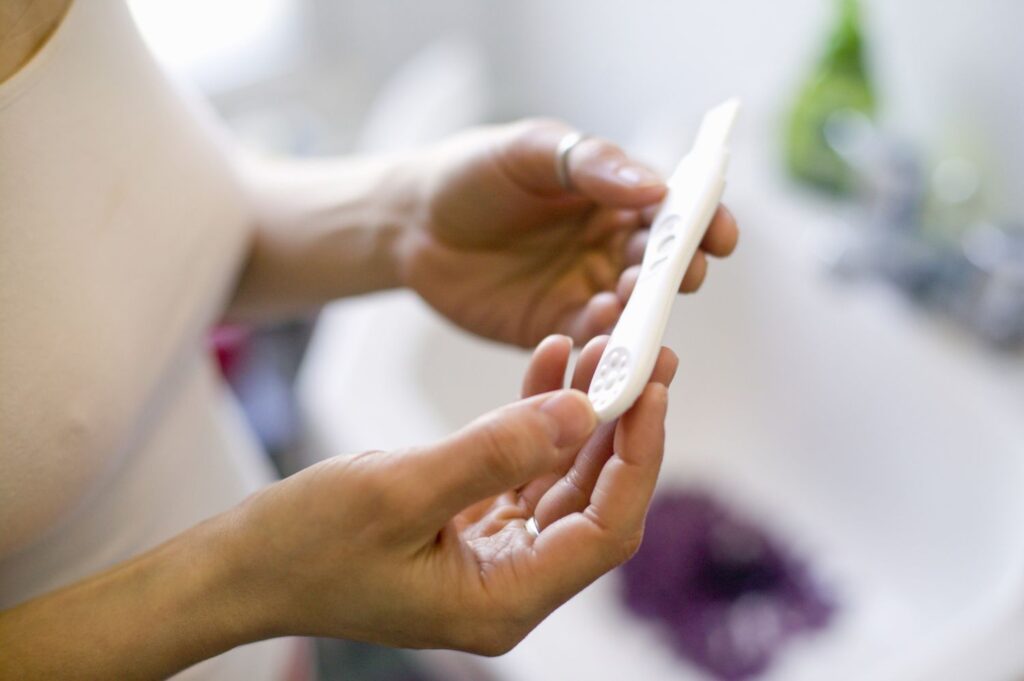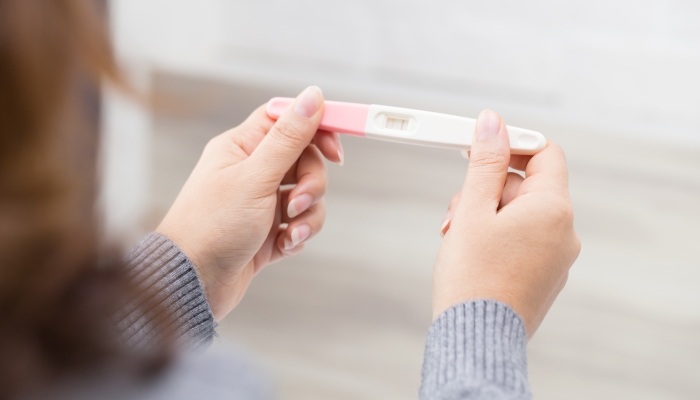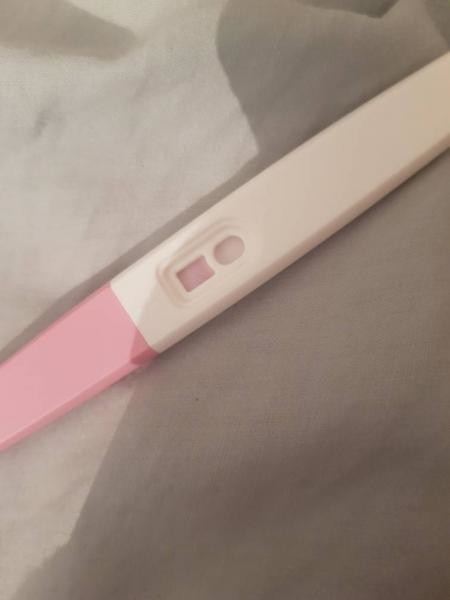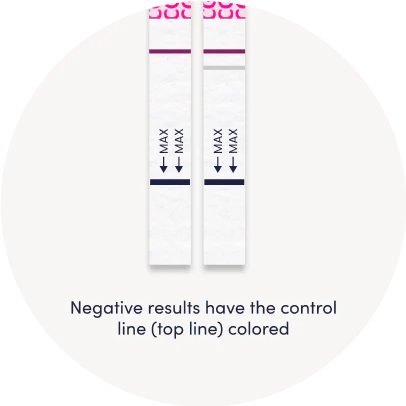An invalid pregnancy test occurs when the test doesn’t provide a clear positive or negative result. This can happen due to various reasons, such as using an expired test, not following instructions correctly, or testing too early. An invalid result doesn’t confirm or deny pregnancy and can be frustrating.
Moreover, it’s necessary to carefully read and follow the test instructions, use a test that’s not expired, and wait for the recommended time to read the result. If faced with repeated invalid results or uncertainty, consulting with a healthcare professional is advisable for further guidance and appropriate testing.
What Are The Causes of Invalid Results?

Expired Tests: Using an expired pregnancy test can lead to inaccurate results, including invalid outcomes. It’s crucial to check the expiration date before conducting the test.
Improper Storage: Incorrect storage conditions, such as exposure to extreme temperatures or moisture, can compromise the integrity of the test, resulting in invalid readings.
Testing Too Early or Late: Pregnancy tests are most accurate when taken at the right time in a woman’s menstrual cycle. Testing too early or too late can contribute to invalid results.
User Error: Failing to follow test instructions precisely, using the wrong urine sample, or misinterpreting results can lead to invalid outcomes. Users must carefully adhere to the guidelines provided by the test manufacturer.
Issues with Test Components: Manufacturing defects, inconsistencies in test components, or damage during transit can contribute to invalid results. Understanding these potential issues is crucial for users relying on the accuracy of home pregnancy tests.
How to Interpret Invalid Pregnancy Test Results with Confidence?

Interpreting invalid pregnancy test results requires a careful approach for accurate understanding.
Common Scenarios Leading to Invalid Tests
Faint Lines
Faint lines on a pregnancy test can evoke uncertainty. While a faint line may indicate pregnancy, it can also result from a lower concentration of the pregnancy hormone hCG. Users should be aware that interpreting faint lines requires caution, and retesting after a few days is advisable.
Missing Control Line
The control line serves as a marker, indicating that the test is functioning correctly. If this line is missing, it suggests a problem with the test strip or improper testing procedures. Users encountering this scenario should conduct a retest with a new kit to ensure accurate results.
Evaporation Lines
Evaporation lines, appearing after the designated test reading time, are another common scenario. Often mistaken for positive results, these lines are caused by the evaporation of urine. Recognizing and disregarding these lines after the recommended time frame is crucial to prevent misinterpretation.
Incomplete Tests
Incomplete tests may occur if the testing process is interrupted or concluded prematurely. This could compromise the result, emphasizing the importance of adhering to the recommended testing duration and ensuring a complete, uninterrupted testing process.
Differentiating Invalid from Positive/Negative Results
Positive Result Clarification
Understanding that a faint line, even if barely visible, typically indicates a positive result is crucial. Users should differentiate between faint positive lines and invalid or evaporation lines to make informed decisions about their pregnancy status.
Negative Result Verification
Clear indications of no pregnancy, such as the absence of a second line or a negative symbol, help users confidently interpret negative results. Recognizing the straightforward presentation of negative results is essential to avoid misinterpretation.
Confirmatory Retesting
In cases of uncertainty, confirmatory retesting is advised. Using a new, properly stored test kit, following instructions diligently, and noting any changes in the testing process can contribute to improved result accuracy and provide reassurance.
Professional Guidance
If doubt persists or if results are inconclusive, seeking professional guidance from a healthcare provider or a certified testing facility is prudent. Healthcare professionals can offer additional testing options and guidance tailored to individual circumstances.
What Are The Factors Influencing Invalid Results?

Testing Too Early or Late
Early Testing Challenges: Testing too early in the menstrual cycle can lead to invalid results as the levels of the pregnancy hormone hCG might not be detectable yet. Understanding the ideal time for testing, usually after a missed period, enhances result accuracy.
Late Testing Complications: Conversely, testing too late, especially if there’s an irregular menstrual cycle, can also pose challenges. Waiting too long may affect the accuracy of the test, and users should consider testing within the recommended timeframe.
Hormonal Variations: Individual hormonal variations can influence the accuracy of pregnancy tests. Factors such as stress, medications, or underlying health conditions may impact hCG levels, emphasizing the importance of considering these factors during testing.
Recommendations for Timing: Following the test’s instructions regarding the appropriate time for testing, and recognizing the influence of individual menstrual cycles and hormonal variations, contributes to minimizing the likelihood of obtaining invalid results.
Improper Test Storage and Usage
Impact of Improper Storage: Proper storage of pregnancy tests is crucial for maintaining their accuracy. Exposure to extreme temperatures or humidity can compromise the integrity of the test components, leading to potential inaccuracies.
Checking Expiry Dates: Users should routinely check the expiration date of the pregnancy test. Using an expired test may result in invalid outcomes, and ensuring the test is within its validity period is a simple yet critical step for accurate testing.
Storage Conditions: Storing tests in a cool, dry place, away from direct sunlight and moisture, helps preserve their effectiveness. Being mindful of storage conditions ensures that the test remains reliable when needed.
Attachment to Instructions: Proper usage, following the manufacturer’s instructions meticulously, is fundamental. Users should be attentive to details, including the duration for which the test should be conducted and the recommended waiting time for result interpretation.
How to Handle and Retest for Accurate Results?
Discover the right steps to take and when to retest if you get a result that’s not clear, making sure you can trust the accuracy of your pregnancy test.
Recommendations for Proper Test Handling
Read Instructions Thoroughly
Start by thoroughly reading and understanding the manufacturer’s instructions accompanying the pregnancy test. Each test may have specific guidelines, and adherence is crucial for accurate results.
Check Expiration Date
Before initiating the test, confirm the expiration date of the kit. Using an expired test may lead to invalid results, highlighting the importance of routinely checking the product’s viability.
Use First-Morning Urine
For optimal accuracy, consider using the first-morning urine sample. This is often more concentrated and contains higher levels of the pregnancy hormone hCG, increasing the test’s sensitivity.
Avoid Dilution
Refrain from diluting the urine sample excessively, as this can impact the concentration of hCG and potentially lead to inaccurate readings. Following instructions for sample collection ensures the test’s reliability.
Be Mindful of Timing
Follow the recommended testing timeframes provided by the manufacturer. Waiting too long or interpreting results too early can result in misleading readings, contributing to the likelihood of an invalid result.
When and How to Retest After an Invalid Result
Wait a Few Days
If an invalid result is obtained, consider waiting a few days before retesting. This allows time for hCG levels to potentially increase in the case of early pregnancy, increasing the likelihood of a clear result.
Use a New Test Kit
When retesting, use a new, unexpired test kit to ensure the reliability of results. Proper storage and handling of the new kit are crucial, and users should follow the same precautions as with the initial test.
Consider Confirmatory Testing
If uncertainty persists or if results are inconsistent, consider seeking professional guidance or opting for confirmatory testing at a healthcare facility. Blood tests conducted by healthcare professionals provide a higher level of accuracy and can confirm pregnancy with certainty.
Review Testing Process
Reflect on the previous testing process. Ensure that all steps were followed correctly, and consider any factors that might have contributed to the invalid result. Making adjustments based on past experiences improves testing accuracy.
Consult Healthcare Professionals
If retesting continues to yield unclear or invalid results, consulting healthcare professionals is advisable. They can offer insights into potential underlying issues and recommend further diagnostic measures to address concerns about pregnancy.
FAQ
What does an invalid First Response pregnancy test look like?
Recognizing an invalid First Response pregnancy test involves understanding various factors, such as faint lines, missing control lines, or unclear results. The appearance may differ, but any deviation from clear positive or negative indications could signal an invalid result.
How long is a pregnancy test invalid?
The validity of a pregnancy test is not determined by a specific timeframe. It depends on factors like proper storage, expiration date, and adherence to instructions. Ensuring the test’s components are intact and following guidelines enhances the accuracy of results.
Is it possible to pee too much on a pregnancy test?
While it’s essential to provide a proper sample for accurate results, excessive fluid may dilute the urine, potentially affecting the test’s sensitivity. Following instructions for sample collection helps maintain the test’s accuracy.
Is it better to dip or pee on a pregnancy test?
Both dipping and peeing on a pregnancy test are valid methods. The choice depends on personal preference and adherence to instructions. Following the recommended testing procedure ensures accurate results regardless of the method chosen.
Can I be 2 months pregnant and have a negative test?
Yes, it’s possible to be two months pregnant and still receive a negative test result. Factors such as individual hCG levels and test sensitivity can influence the outcome, leading to false negatives.
Can you be 5 weeks pregnant and test negative?
Yes, a negative test at 5 weeks into pregnancy is possible. Variables like hCG levels and test sensitivity contribute to the likelihood of false negatives. Consulting a healthcare professional for confirmation is advised.
Can you be 3 months pregnant and test negative?
Yes, it’s possible to be three months pregnant and receive a negative test result. Factors like hCG levels and test sensitivity can influence outcomes, leading to false negatives. Seeking medical advice for confirmation is recommended.
Can I be 6 weeks pregnant and still test negative?
Yes, receiving a negative test at 6 weeks into pregnancy is possible due to factors like individual hCG levels and test sensitivity. For a more accurate assessment, consulting a healthcare professional is advisable.
Can I be 8 weeks pregnant and still test negative?
Yes, it’s possible to be eight weeks pregnant and receive a negative test result. Factors such as hCG levels and test sensitivity contribute to the likelihood of false negatives. Seeking medical advice for confirmation is recommended.
Final words
Interpreting invalid pregnancy test results can be perplexing, but understanding common scenarios and factors influencing inaccuracies is key. If faced with uncertainty, retesting with a new, unexpired kit following proper guidelines is recommended.
Remember, early testing or improper storage can contribute to invalid results. Seek professional guidance if doubts persist. Navigating these nuances ensures accurate results and empowers individuals in their reproductive health journey. Always prioritize adherence to instructions and consult healthcare professionals for a comprehensive understanding of your unique situation.



